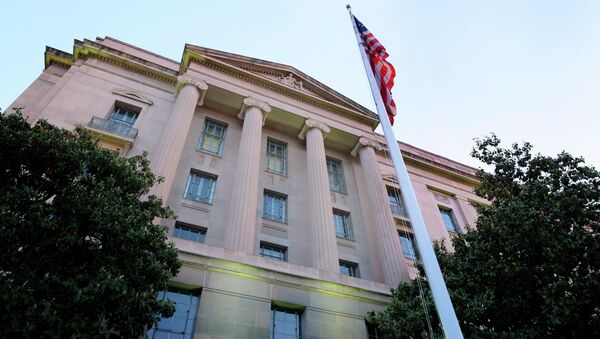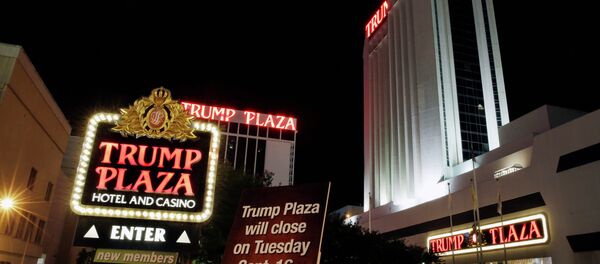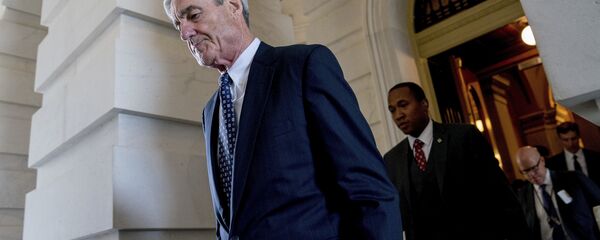Mueller's Wednesday comments were intended to clarify the intentions of the special counsel's office before he resigned from the position, but they opened up whole new cans of worms. While Democrats read between the lines and renewed their bid to impeach US President Donald Trump, Sputnik looked at the policy Mueller used to throw the issue "in the lap of Congress," as award-winning editorial cartoonist and columnist Ted Rall put it.
"Anyone can take what they want out of it," Rall told Radio Sputnik's Loud and Clear Wednesday, "and they already are."
"Mueller's been careful to thread the needle — and you know, when we discussed this a few months ago, I remember predicting that in the end, all we would end up with is a big fat report, and that's all that's happened."
Rall noted the idea that a sitting president can't be indicted "was on the far fringes of right-wing legal theory until fairly recently, and now it's widely accepted as truth and fact, but there's never been a Supreme Court ruling about it… It doesn't really make much sense." He noted it was the work of "some right-wing legal theorists."
Rall noted Mueller's statement that indicting Trump while he's still in office would be "unconstitutional" was "a big stretch. Only the Supreme Court could determine that, and they never have weighed in; it's never been before them."
"At this point he's throwing it in the lap of Congress, and it's up to them, and we know they don't have any intention to try to impeach Trump, so it's kinda like it's been two, three years of a whole lot of nothing."
The DOJ's policy isn't part of the US Constitution, either. In fact, it only dates to September 1973, when the DOJ's Office of Legal Counsel (OLC) adopted an internal memo in the midst of the Watergate scandal, finding that a sitting president couldn't be indicted.
Noting that impeachment is the first response to presidential misconduct, the memo author wrote, "This would suggest strongly that… criminal proceedings against a President in office should not go beyond a point" that they would effectively remove a president, and thus become a shortcut for impeachment, The Atlantic noted.
"The spectacle of an indicted president still trying to serve as Chief Executive boggles the imagination," the memo stated.
However, then-Solicitor General Robert Bork, the DOJ's number 2, argued a few weeks later that you could indict a vice president, but not a president, since the president has "complete power over the execution of the laws," making a prosecution of himself by himself absurd. He would not only be responsible for punishing himself, but would also be capable of pardoning himself.
The president at the time, Richard Nixon, resigned in 1974 as the threat of impeachment proceedings intensified.
The OLC then ignored the issue until 2000, when it reexamined the question and came to the same conclusion: "The Framers considered who should possess the extraordinary power of deciding whether to initiate a proceeding that could remove the President… and placed that responsibility in the elected officials of Congress. It would be inconsistent with that carefully considered judgment to permit an unelected grand jury and prosecutor effectively to ‘remove' a President by bringing criminal charges against him while he remains in office."
However, The Atlantic noted that two years prior, a constitutional scholar who was advising then-independent counsel Kenneth Starr during his probe of President Bill Clinton's affairs in what became known as the Whitewater scandal reached the opposite conclusion.
In a memo only made public to the New York Times in 2017, Ronald W. Rotunda advised Starr that Clinton could be indicted because the creation of the independent counsel itself implied Clinton's consent to be indicted, and because the subject of the investigation — "witness tampering, document destruction, perjury, subornation of perjury, obstruction of justice, conspiracy, and illegal pay-offs… in no way relate to… President Clinton's official duties" and "are contrary to" his duty "to take care that the law be faithfully executed."
Those principles apply in some ways to Trump's situation: the question of obstruction of justice centers on whether or not Trump's actions were in line with the performance of his duties as president, such as the firing of FBI Director James Comey in May 2017, and it was Trump who directed the creation of Mueller's task force to begin with, just days after Comey's termination.
In the end, though, Starr didn't indict Clinton, although the president did later endure impeachment proceedings in which he was only narrowly acquitted.
"Democrats intend to make as much hay out of this as they possibly can as the [2020 election] campaign starts to heat up," Rall said.
However, he noted the impeachment circus plays into Trump's hands, too.
"It also plays into conservative Republican narratives of victimhood as well. It happens to have a lot of credibility. I think the scary part, if you are a Trump hater, is that there's a lot of people on the fence here, 5 or 10% of swing voters — if swing voters still exist — who objectively are going to look at this and agree with Trump's conclusions that this has been a nothingburger," Rall said.





